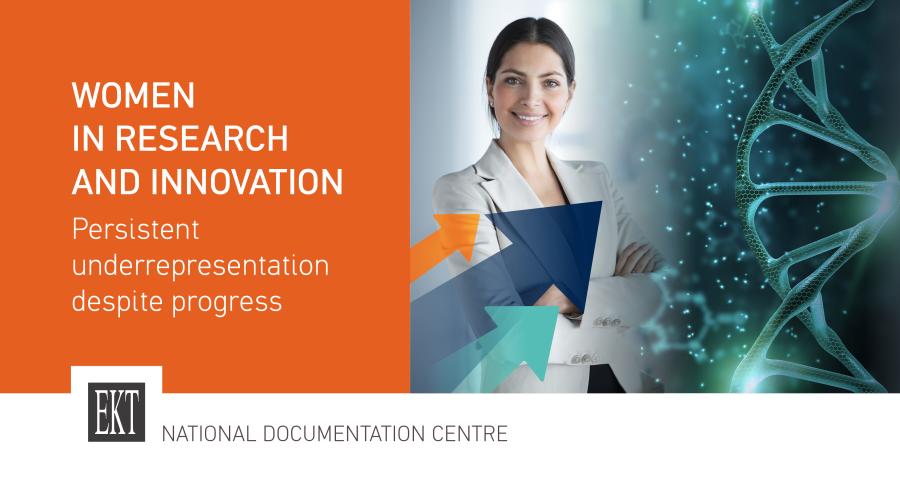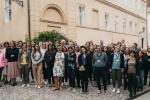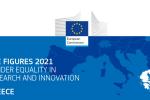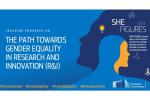
The equal participation and contribution of women and men in all sectors of the economy is a social, political and developmental issue that is internationally recognised as a significant challenge for modern societies. Available evidence shows that the limited representation of women in leadership and management positions characterises almost all sectors of the economy, including the research and innovation ecosystem.
The EKT systematically monitors and documents, with data and indicators, the contribution of women to the Greek research and innovation ecosystem, emphasizing the interconnection of statistical indicators with specific public policies and initiatives. In the context of International Women's Day, EKT has published a leaflet with the latest findings of its research and publications on the position of women in the fields of research, development and innovation.
The United Nations has designated 2030 as the landmark year for achieving gender equality (Planet 50-50 by 2030). According to McKinsey's recent Women in the Workplace 2022 survey, the biggest obstacle women face in their careers lies in their advancement to managerial positions as they too often stagnate in job roles and positions that do not correspond to their abilities and qualifications. For example, according to the Global Gender Gap Report 2021 of the World Economic Forum, women aged 25-64 with university education exceed the corresponding percentage of men in our country. However, their proportion in leadership and managerial positions remains low. The recent edition of the European Commission's SHE figures 2021, to which EKT provided the data for Greece, show that, although the gender gap in education is narrowing, the underrepresentation of women in the research and innovation ecosystem in Greece remains.
To address this gap, there are several initiatives at European and national level to enhance female entrepreneurship and managerial positions in companies. In the field of research and innovation in particular, gender equality and gender mainstreaming in research itself are key priorities for the European Research Area to achieve the horizontal objective of the Horizon Europe 2021-2027 funding programme.
Statistics on the role of women in R&D and innovative enterprises
In the National Action Plan for Gender Equality 2021-2025, EKT is recognised as the body that systematically provides the indicators for women's participation in Research and Development. EKT actions have related to documentation, information, counselling and networking to support women's participation in research projects, the development of female entrepreneurship and the promotion of innovation since 2007, when an extensive census of Greek women researchers was carried out for the first time.
The recent EKT publication 'The participation of women in Research & Development in Greece - 2022 Edition' (GR) presents data on PhD holders for those working in research and development bodies and organisations and those participating in research projects and actions. Gender shares in new PhD holders show some fluctuations, although there is generally an equal distribution. For example, this is the case for those who obtained their PhD in 2021.
According to the data of the SHE figures 2021, the participation of women at grade C of the academic hierarchy (Assistant Professor) is 36.7%, while at grade A, Professor, it falls to 22.3% (the corresponding European averages are 46.6% and 26.2%). These data show that the percentage of women reaching the highest hierarchy level is almost half as high as those at grade C.
On the other hand, we see a fairly positive picture in the representation of women in the staff employed in the Greek Research and Development (R&D) ecosystem. According to official statistics for 2020, out of 110,134 Research and Development (R&D) employees, 47,538 are women (43.2%), with Greece ranking 7th among the 27 countries of the European Union. Looking at the research staff, which for 2020 was 72,234 people, the percentage of women was 38.8%, ranking Greece 10th among the EU countries.
In the case of a series of national actions to support young researchers, funded by the European Social Fund under the NSRF 2014-2020, higher participation rates are recorded for women. A typical example is the actions to support doctoral candidates, whose share reaches 60.5%. However, in the case of teaching experience enhancement actions, women lag behind men in all academic years under review.
The previous EKT survey, 'The participation of women in Research & Development in Greece- 2021 Edition' (GR) also presents data for Greek scholars of the European Research Council (ERC) from 2014-2020. In it, the participation rate of women stands at 27.6%, with fluctuations per year. In the Marie Sklodowska Curie (MSCA) actions, again for the period 2014-2020, the overall participation rate of women is higher than that of ERC fellows reaching 37.9%.
Finally, EKT's survey on innovation in Greek companies recorded gender representation among board members and/or owners of innovative businesses. The data shows that only one in four owners or board members are women (26.2%). In large companies, women's representation is even lower, with only one in five being owners or board members (18.5%).
Conclusions
Despite exceptions and successful examples from women in positions of responsibility in the research and innovation ecosystem, many women still work in positions that do not match their qualifications and competences.
The available data raise serious issues for the rational exploitation of this significant portion of our country´s scientific and business human capital. The targeted surveys and publications of the National Documentation Centre (EKT) record the contribution of women to the Greek research and innovation ecosystem, emphasising the interconnection of statistical indicators with specific public policies and initiatives.
By providing reliable statistical data on this very important topic, EKT contributes decisively to the public debate to achieve the goal of gender equality as soon as possible and to systematically promote the guarantee of equal opportunities for women researchers and entrepreneurs so that they contribute even more to research, development, innovation and digital transformation of our country.
The National Documentation Centre
EKT is a research institution and a National Authority of the Hellenic Statistical System. It is strategically linked to the research and academic community, business and policymakers. It develops modern services and infrastructures for the dissemination of reputable knowledge, the production and distribution of statistical data, the documentation of public policies, the digital transformation and the connection of research with the economy and civil society.
The EKT publications from which the data presented above were extracted are available and freely accessible at metrics.ekt.gr/en. There you can find analytical data and charts that shed light on the crucial role of women in the Greek research and innovation ecosystem.















